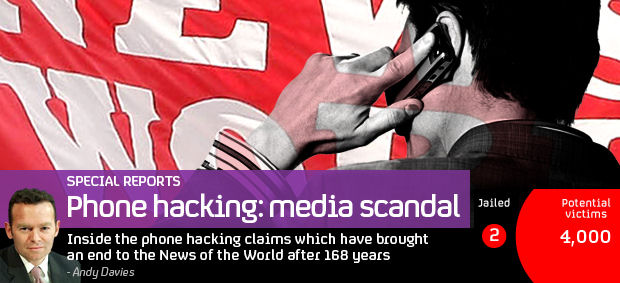Phone-hacking probe: witness to give evidence under oath
David Cameron sets out an independent inquiry into phone hacking led by Lord Justice Leveson, saying that anyone involved in illegal activity, however high up, must play no part in the UK media.
Prime Minister David Cameron announces a two-part investigation into the phone-hacking controversy which will have the power to summon newspaper proprietors, police and politicians to give evidence under oath.
Following a boisterous grilling in Prime Minister’s Questions, David Cameron told the Commons that Lord Justice Leveson is to chair the inquiry which will be split into two parts.
The investigation will look into the ethics and culture of the British media as well as the specific claims about phone hacking at the News of the World, the shortcomings of the initial police inquiry, and allegations of illicit payments to police by the press.
The initial part of the public inquiry should report on the regulation of the press within 12 months, Mr Cameron said. The investigations into allegations of wrongdoing in the press and police are expected to conclude later, once criminal proceedings have ended.
The Prime Minister set out the remit of the single inquiry – which replaces his previous proposal for two separate investigations – shortly after telling the House of Commons that those responsible for phone hacking should be prosecuted.
In fiery exchanges at PMQs, Mr Cameron said that his former head of communications Andy Coulson should be prosecuted if it is proved that he lied when he claimed to know nothing about phone hacking at the News of the World while he was editor.
Outside of the Commons it was announced that News International’s long-serving legal manager Tom Crone has left the company.
Mr Crone was responsible for advising the News of the World and the Sun on editorial matters before and after publication. The reason behind his resignation was unclear.
Before the shock announcement that News Corp has withdrawn it’s bid for BSkyB, political party leaders had united against Rupert Murdoch’s planned takeover of the broadcaster.
The Conservatives and Liberal Democrats supported Labour’s motion to call on Rupert Murdoch to withdraw his bid to buy the 62 per cent of the broadcaster his media empire does not own.
‘Robust’ investigation
In a statement to MPs ahead of a Commons vote on Rupert Murdoch’s takeover of BSkyB, Mr Cameron insisted the inquiry would be “one that is as robust as possible, one that can get to the truth fastest and get to work the quickest, and one that commands the full confidence of the public”.
A Metropolitan Police team led by Deputy Assistant Commissioner Sue Akers has made eight arrests and is currently looking through 11,000 pages of documents seized from private investigator Glenn Mulcaire in 2005 and has identified 3,870 names, and around 4,000 mobile and 5,000 landline phone numbers.
During a rowdy exchange at PMQs, Mr Cameron said News International – which owns the Sun, Sunday Times and the former News of the World – should have a “root and branch” at the entire organisation said those responsible for the “disgraceful” hacking into private phone calls should be prosecuted.
The prime minister said that a “firestorm” had engulfed Britain’s press, police and political system as a result of the phone-hacking allegations.
Labour leader Ed Miliband called on the Prime Minister to apologise for his “catastrophic error in judgment” in appointing Andy Coulson to a communications chief after he had resigned as News of the World editor after two people working for the paper were jailed for phone hacking.
And Mr Miliband said another former News of the World editor, Rebekah Brooks, should be removed from her current position as News International chief executive, branding her continued employment by the company an “insult” to the family of murdered teenager Milly Dowler, whose family were watching from the public gallery.
Mr Miliband welcomed the terms of the inquiry set out by Mr Cameron and said it should be staffed and running before Parliament breaks up for its summer recess on July 19.
